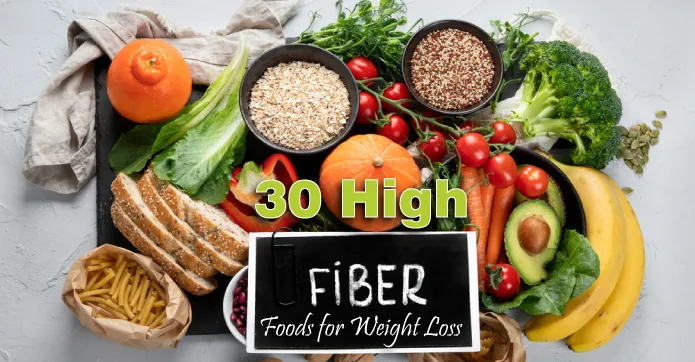Fiber is your best friend for health and sustainable weight loss. Unlike fast-digesting foods that spike blood sugar and leave you hungry, fiber slows digestion, stabilises blood sugar, and keeps you feeling full longer. Including 30 high-fiber foods for weight loss can help you stay satisfied and support your weight loss journey while promoting overall health.
Let’s look at some high-fiber-rich foods that aid in weight loss and nourish your body with essential nutrients.
Fruits High-Fiber Foods
1. Raspberries
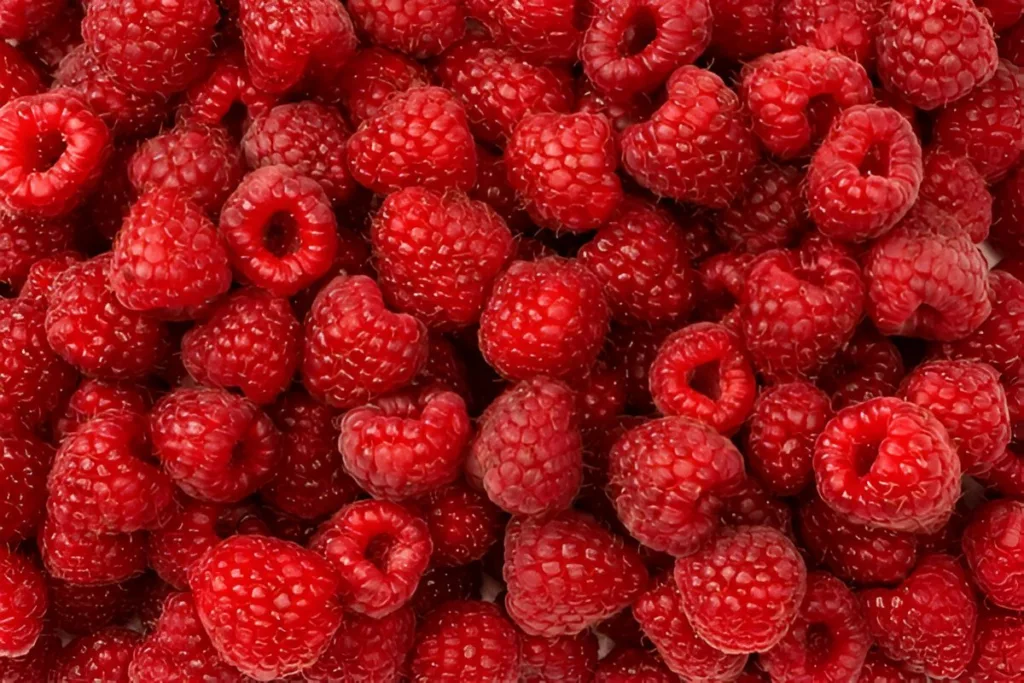
Raspberries are among the highest-fiber fruits, weighing around 8 grams per cup. This fiber improves digestion and keeps you full for extended periods, automatically stopping you from unnecessary snacking and resulting in healthy weight loss. This fruit is low in calories, giving you the option of guilt-free snacking.
Raspberries are a great source of vitamin C and are packed with antioxidants and nutrients like manganese, which shield cells from any damage. You can make their smoothies or add them to your oatmeal, yoghurt, or salads and boost your daily fiber intake, which is also a healthy treat.
2. Pears
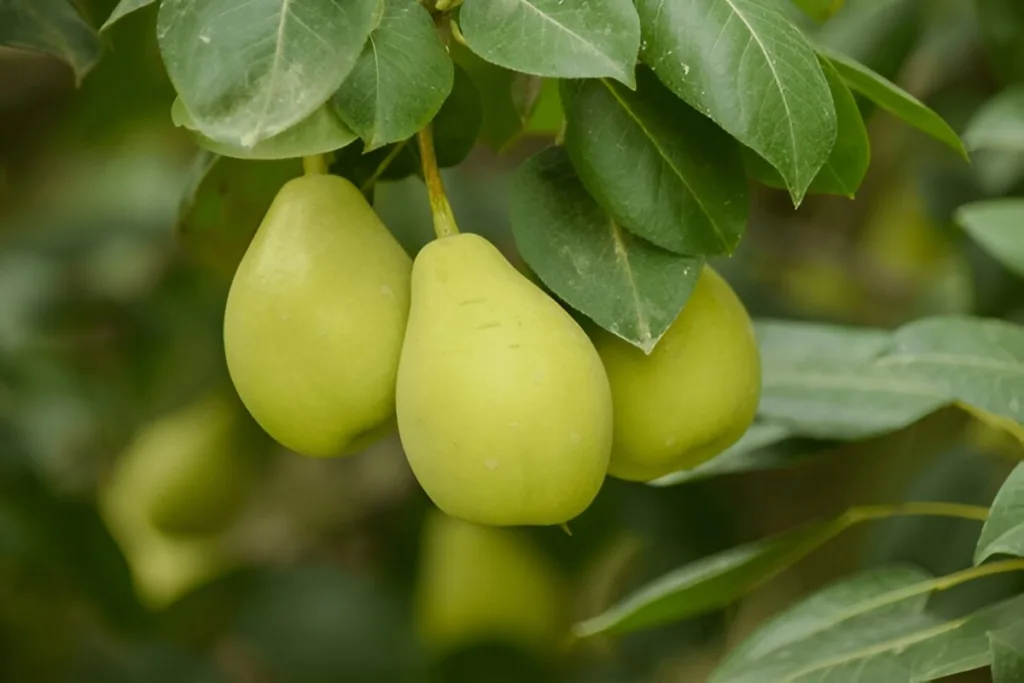
Pears are filled with fiber and nutrients; if you have them without peeling their skin, they are more beneficial. A medium-sized pear provides around 5-6 grams of fiber and enhances your digestive system. It keeps you satiated, aiding in weight management.
Pears’ skin is enriched with the highest fiber content, so it is better to have this fruit with its skin for maximum benefit. Pears are also very helpful in keeping your blood sugar levels balanced as they are low in glycemic index and provide steady energy. The perfect option for snacking, salads, or even as a baked dessert.
3. Apple
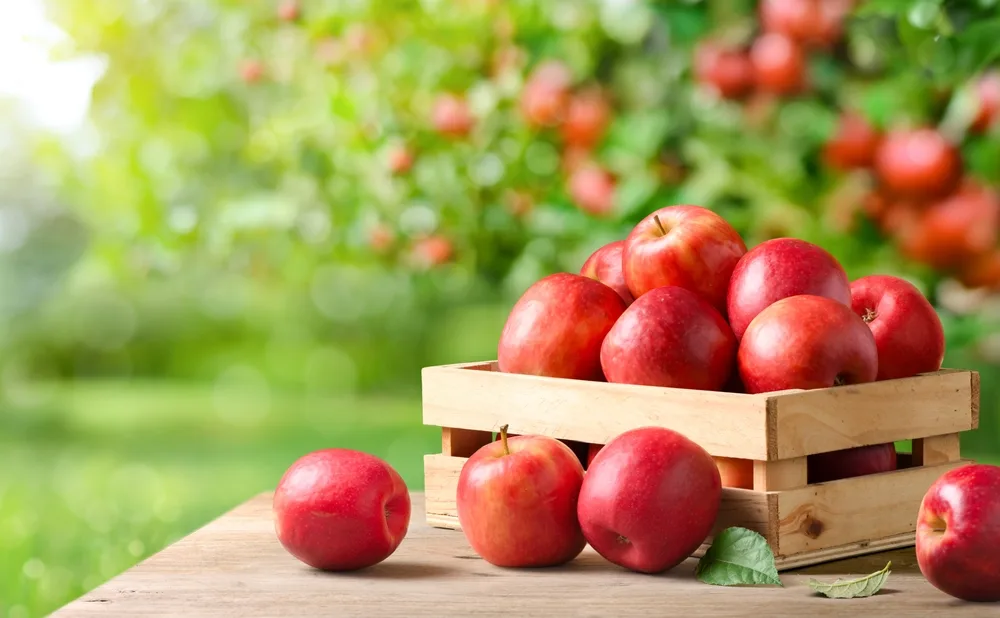
An apple a day keeps the doctor away; yes, it’s true; apple is filled with fiber you can enjoy anytime, anywhere. Apple skin is filled with fiber; a medium-sized apple with the skin gives you about 4 grams of fiber, which supports your digestive health and keeps you full for longer. Additionally, apples are low in calories and sugar, elevating your weight loss goals.
Most fiber and antioxidants are packed in the skin, so don’t peel it off. Apples also contain polyphenols, which can boost metabolism and aid fat burning. Whether you toss them into salads or grab one on the go, apples are a smart, weight-loss-friendly snack.
4. Avocados
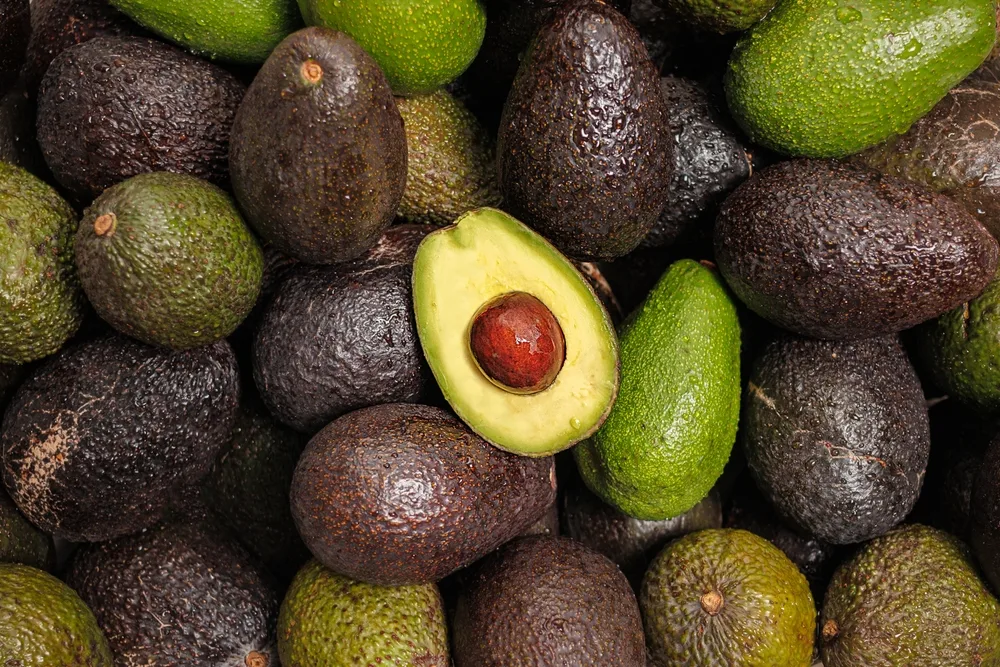
Sometimes avocados are seen as a fatty food, but they are an excellent source of fiber too. A single avocado offers you about 10 grams of fiber, improves your digestion, and keeps you satiated, promoting healthy weight loss.
In addition to fiber, avocados deliver heart-healthy monounsaturated fats, potassium, and essential vitamins. Their creamy texture makes them perfect for salads, smoothies and spreads. Including avocados regularly in your meals can help keep you full longer and provide essential nutrients your body needs.
5. Bananas
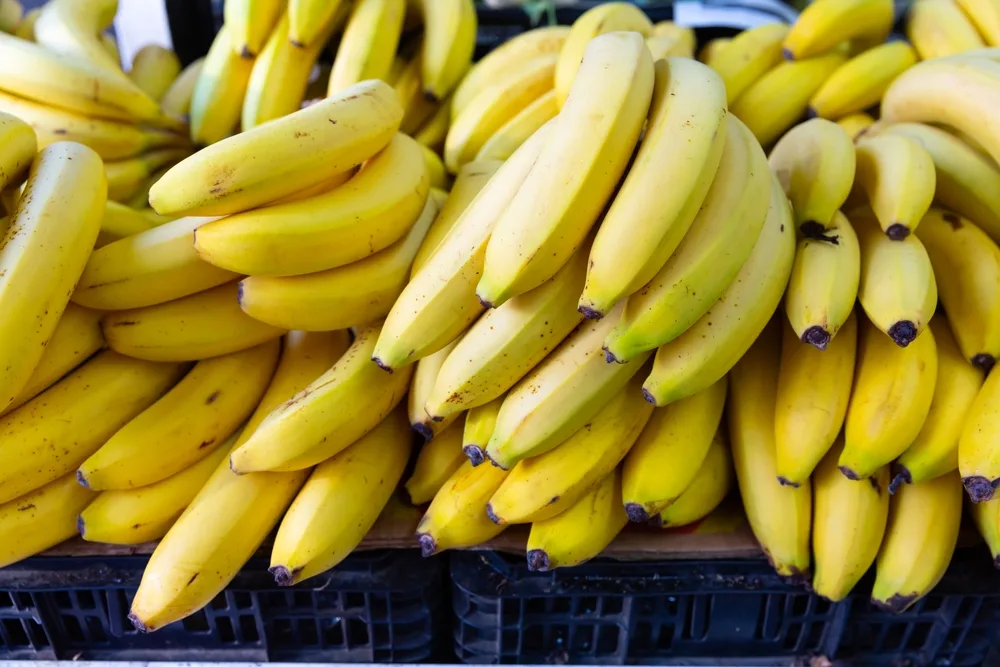
Banana is a popular fruit known for many reasons, from its great taste to its ability to aid in weight loss. It is also very rich in fiber content; a medium-sized banana delivers about 3 grams of fiber, which is very helpful in supporting digestion and promoting a feeling of fullness. Slightly green bananas contain resistant starch, which acts like fiber and helps enhance healthy gut bacteria growth.
Bananas are also rich in potassium, a mineral that is very helpful in maintaining healthy blood pressure and reducing bloating by balancing fluid levels in the body. The best part is that it can be eaten as a snack, added to smoothies, or eaten independently.
6. Oranges
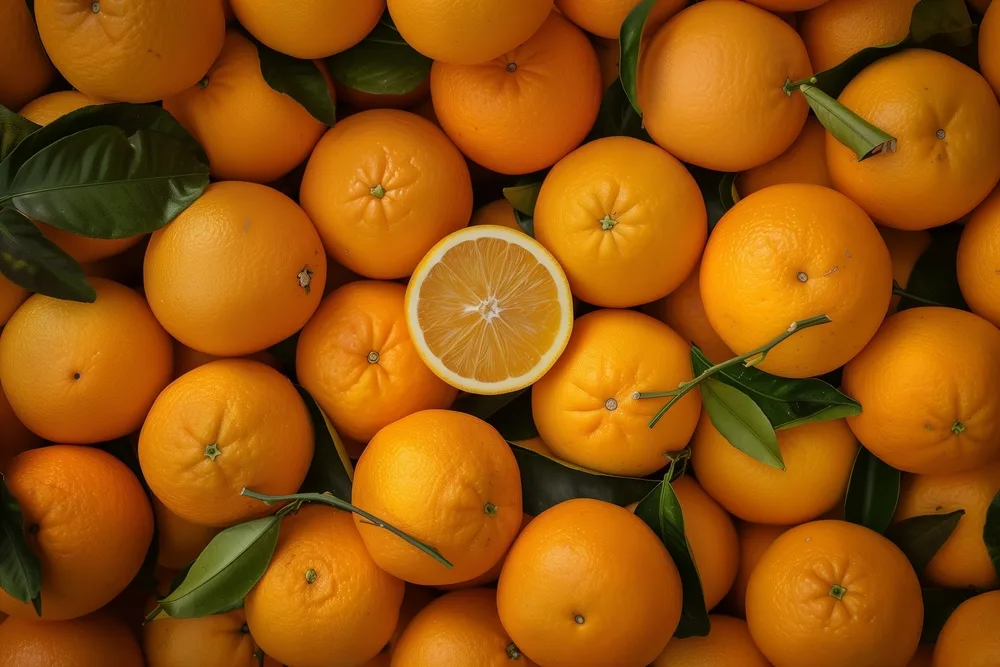
Oranges are not just a refreshing fruit but a great source of fiber. A medium-sized orange provides you with about 3-4 grams of fiber. The natural sweetness of an orange combined with fiber promotes healthy digestion and keeps you satiated for longer.
Additionally, oranges are a rich source of vitamin C, which is very beneficial in maintaining a healthy immune system and makes your skin glow. Oranges have a high water content that keeps you hydrated throughout the day. Because of their versatility, oranges can be eaten independently, have the juice, or tossed into your salads and enjoyed.
7. Guava
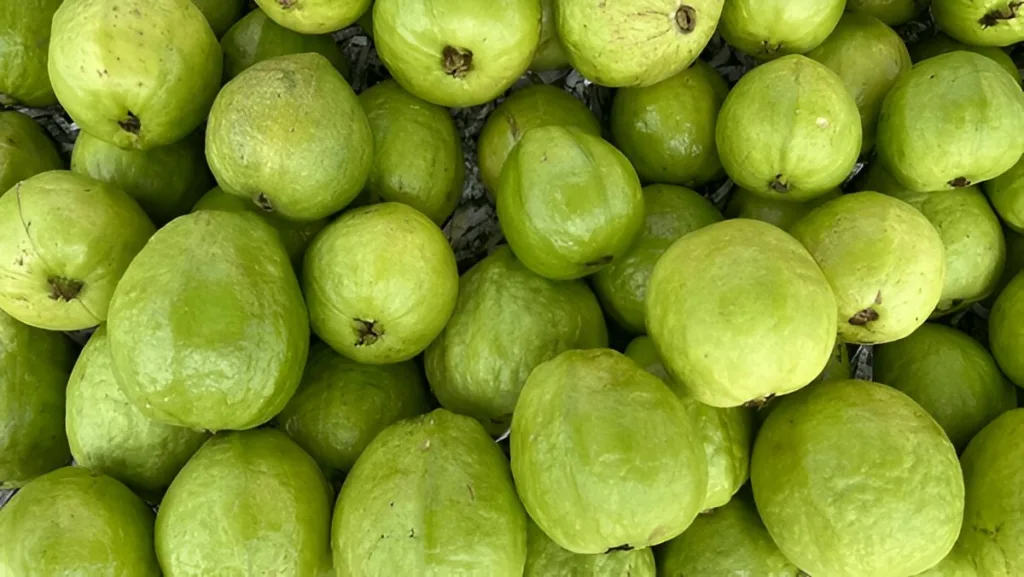
Guava is a dietary fiber-rich fruit packed with nutritional properties. Just one Guava can provide up to 5 grams of fiber, which is beneficial in digestion, controlling appetite, and improving gut health. Its high fiber-rich content keeps you satiated for a long time.
Besides fiber, Guava is also a rich source of vitamin C, which boosts your immunity and elevates your skin texture, making it more glowing. The antioxidant properties of Guava protect our body from harmful free radicals. You can enjoy them fresh, make fruit salad, or enjoy them in smoothies as a tasty, fiber-rich meal.
Seeds High-Fiber
8. Chia Seeds
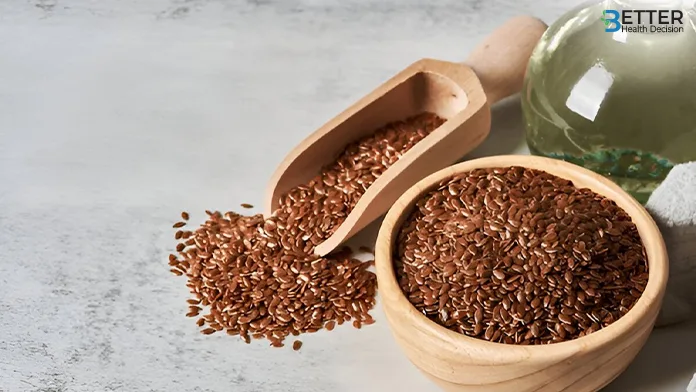
Chia seeds are tiny in size but are very effective in weight loss. Two tablespoons of these small seeds provide up to 10 grams of fiber, making them one of the richest natural fiber sources. Chia seeds’ size expands as they absorb water, keeping you full longer.
As they absorb water and expand in size, this expansion in the stomach keeps you satiated and helps you minimise unnecessary snacking that often results in weight gain. Including chia seeds in your diet can naturally support weight loss because they will keep you satiated for a long time and provide you with energy throughout the day.
9. Flaxseeds
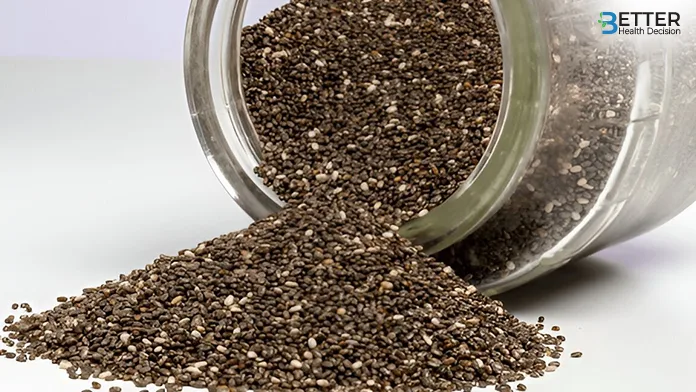
Flaxseeds are fiber-rich dietary foods that provide around 7-8 grams of fiber per two tablespoons of ground seeds. Enriched with high fiber content, they help improve your digestion, keep you satiated, and elevate your gut health. Flaxseeds are the best option; they are easy and nutritious to add to daily meals.
Besides fiber content, flaxseeds are filled with omega-3 fatty acids that promote heart health and enhance fat burning. These healthy fats also have anti-inflammatory properties. Including fiber-rich foods for weight loss, like flaxseeds, can support digestion and aid in fat loss. Just sprinkle flaxseeds on your salads and oatmeal, or add them to your baked goods for a quick, easy, nutritious fiber boost.
10. Pumpkin Seeds
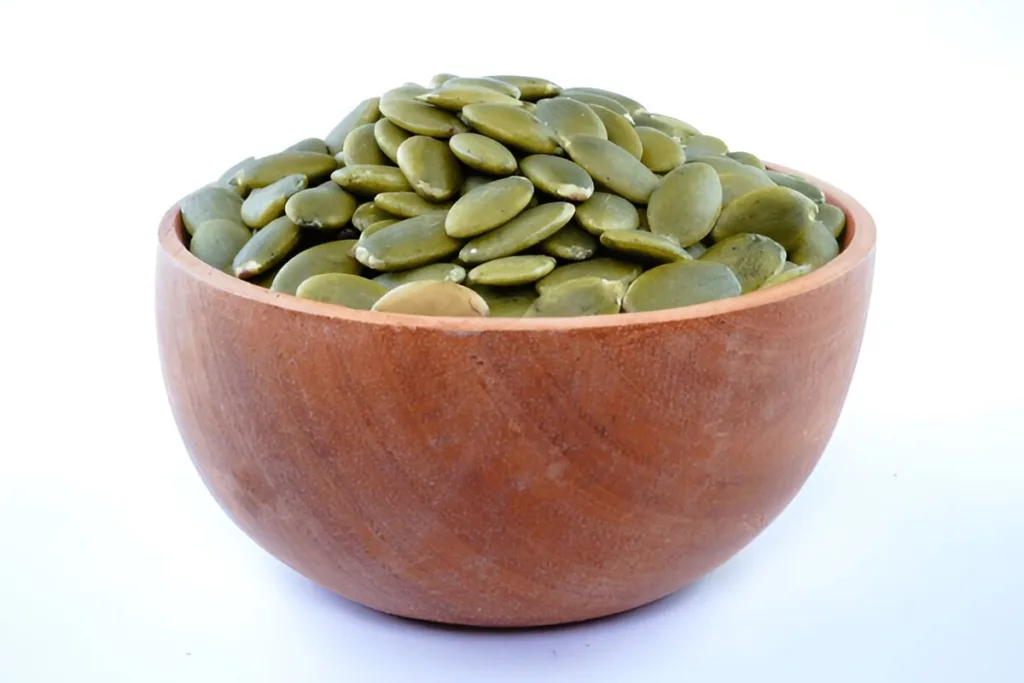
Pumpkin seeds are well known for healthy fats and are a good source of high fiber content, offering about 1.1 grams per ounce. The fiber in pumpkin seeds aids in regulating bowel movements, reduces bloating, and keeps you satiated, which helps you curb unhealthy cravings.
Pumpkin seeds are also enriched with magnesium, zinc, and antioxidants that are very helpful in maintaining a healthy heart and reducing inflammation that affects digestion. These can be used as a crunchy snack, sprinkled on your salads, or just added to your smoothies and enjoyed.
11. Sunflower Seeds
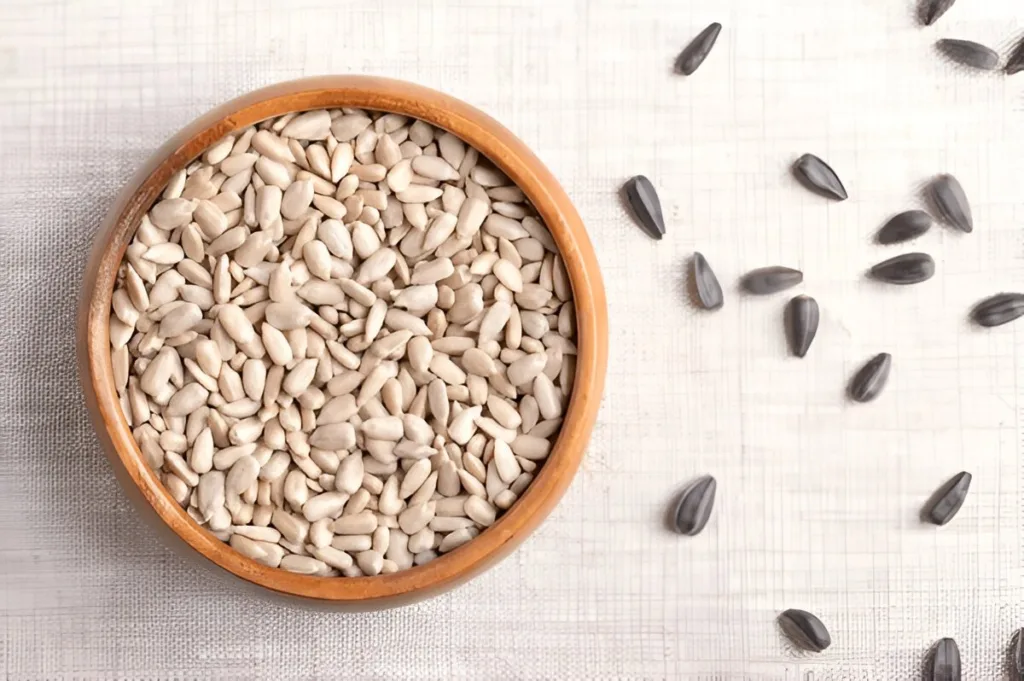
Sunflower seeds are an excellent fiber source, offering up to 3 grams per ounce. The fiber in sunflower seeds helps regulate blood sugar levels, promotes a healthy heart, and keeps you energetic throughout the day. Pumpkin seeds are an ideal snack that prevents overeating and maintains energy levels.
Besides fiber content, sunflower seeds are enriched with vitamin E, a powerful antioxidant that enhances skin health. You can blend sunflower seeds into smoothies, have them as toppings in your yoghurt, or just have them as a crunchy snack and healthily increase your fiber intake.
12. Hemp Seeds
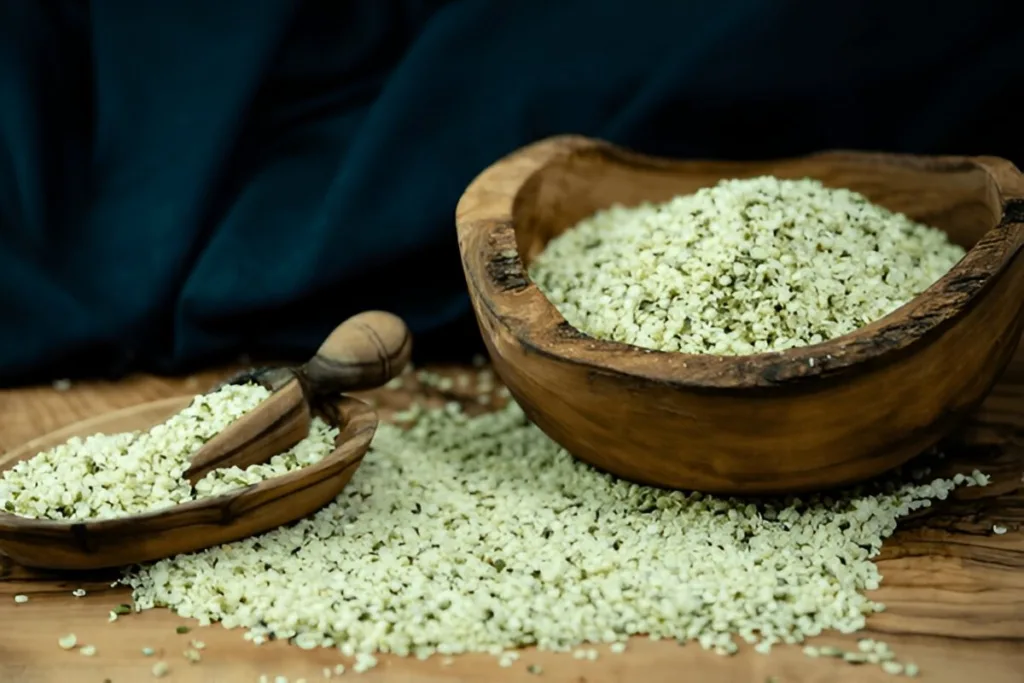
Hemp seeds are small in size but are filled with many benefits. With about 1 gram of fiber per tablespoon, they provide the perfect combo of fiber, protein, and healthy fats that keep you satiated and energised for extended periods and elevate your digestive health.
Enriched with omega-3 and omega-6 fatty acids, hemp seeds reduce inflammation and promote heart health. An easy addition to your diet, sprinkle them on your favourite salad, blend them into your smoothies, or have them as a baked treat for a fiber-rich, nutritious boost.
Lentils and Legumes are High In Fiber
13. Lentils
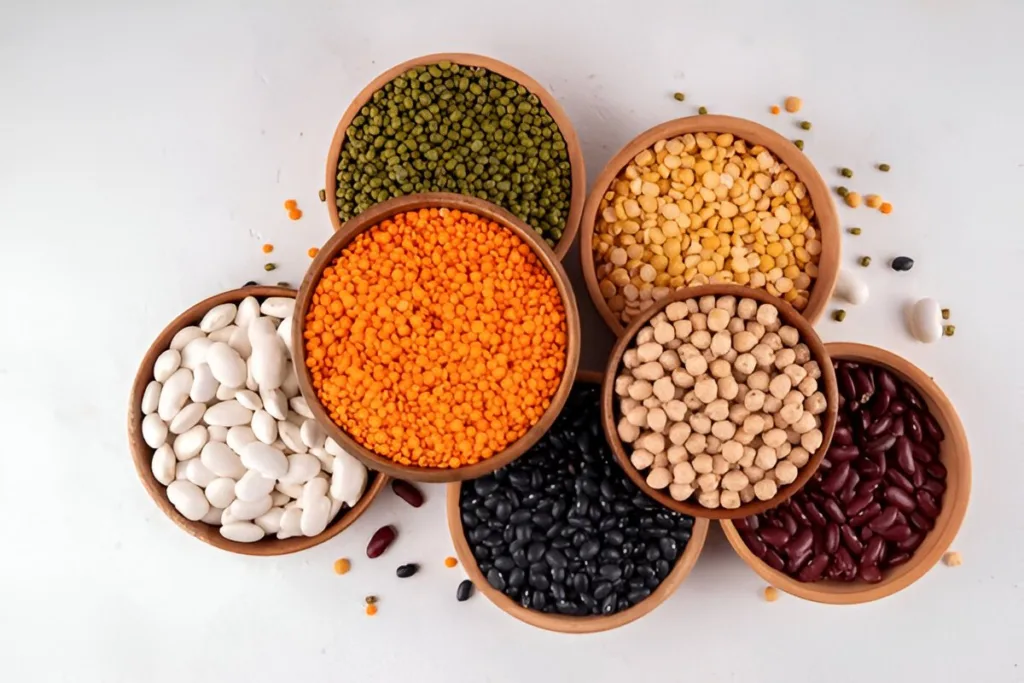
Lentils are enriched with both fiber and protein. They belong to the legume family, a plant-based, high-fiber group. One cup of cooked lentils can provide up to 15.5 grams of dietary fiber.
Lentils are enriched with essential nutrients like iron, folate, and plant-based protein. These nutrients enhance your energy levels, support digestion, and make lentils a brilliant addition to your balanced diet, especially for vegetarians and those who want to elevate their gut health.
14. Black Beans
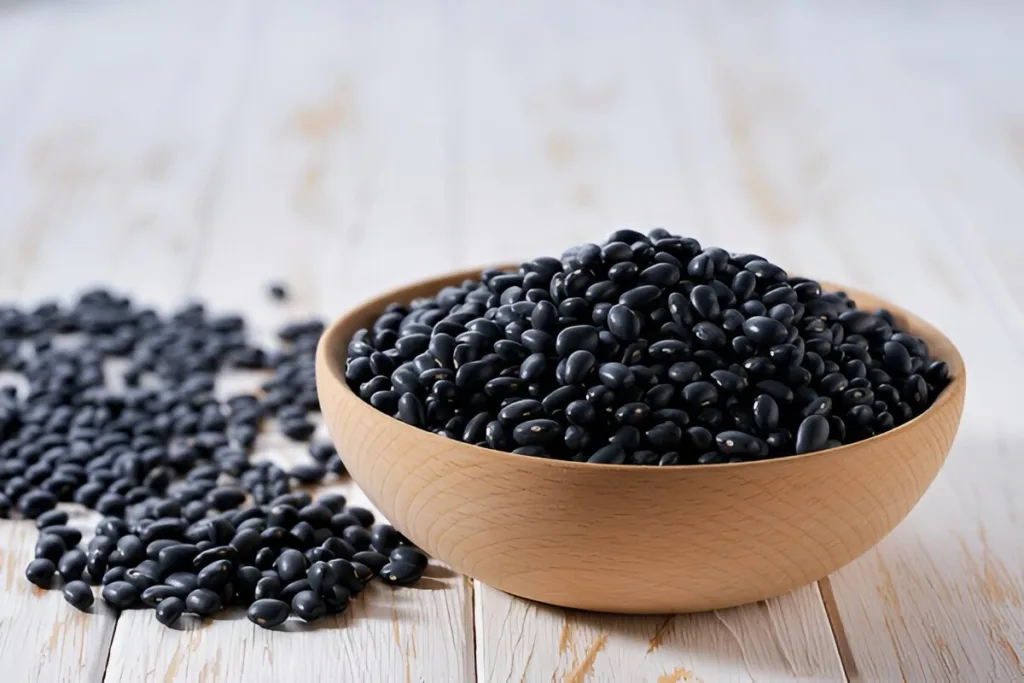
Black beans are a rich source of fiber that offers about 15 grams of fiber per cooked cup. It is a rich soluble fiber that helps lower your cholesterol levels and keeps you satiated for long, aiding in your appetite control and weight loss management.
Besides fiber, black beans are enriched with plant-based protein, iron, and antioxidants, enhancing your digestive system and supporting heart health. With this nutritious quality, you can have them as a soup, toss them into salads, or add them to your burrito bowls and enjoy your fiber and protein-enriched meal.
15. Chickpeas
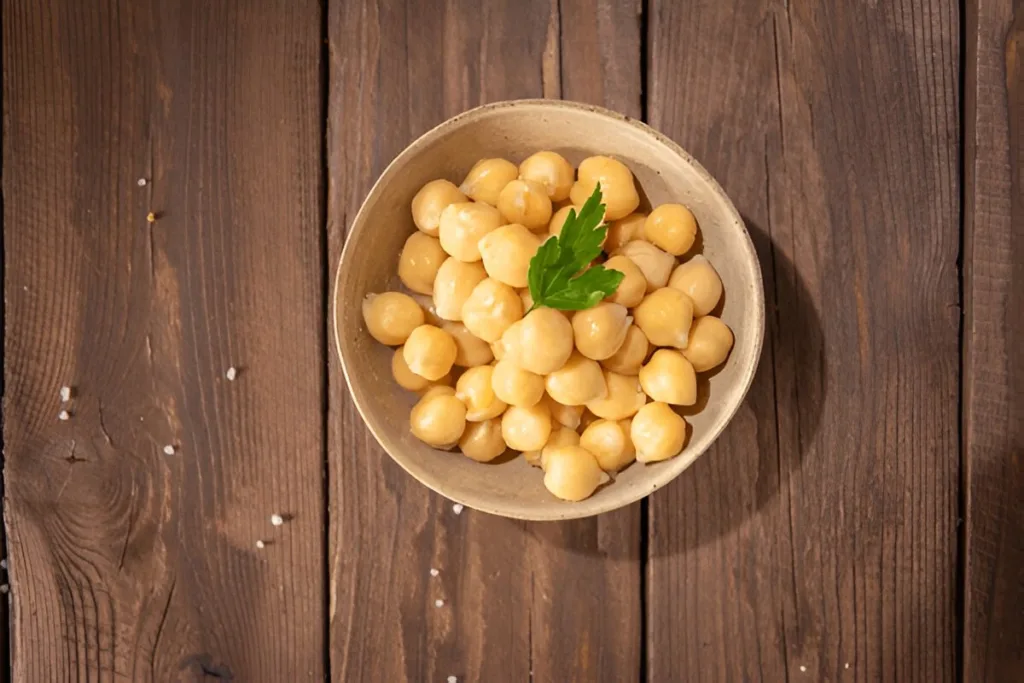
Chickpeas are an excellent source of fiber, offering up to 12 grams per cup of cooked chickpeas. This fiber content in chickpeas helps reduce bloating, elevates gut health, and is very beneficial for heart health.
Besides fiber content, chickpeas are a great plant-based protein, making them ideal for vegetarians and vegans. They are also enriched with essential nutrients like iron and folate, promoting red blood cell production and preventing anaemia. Toss them into salads, blend them into hummus, or have them as a crunchy, nutritious snack.
16. Kidney Beans
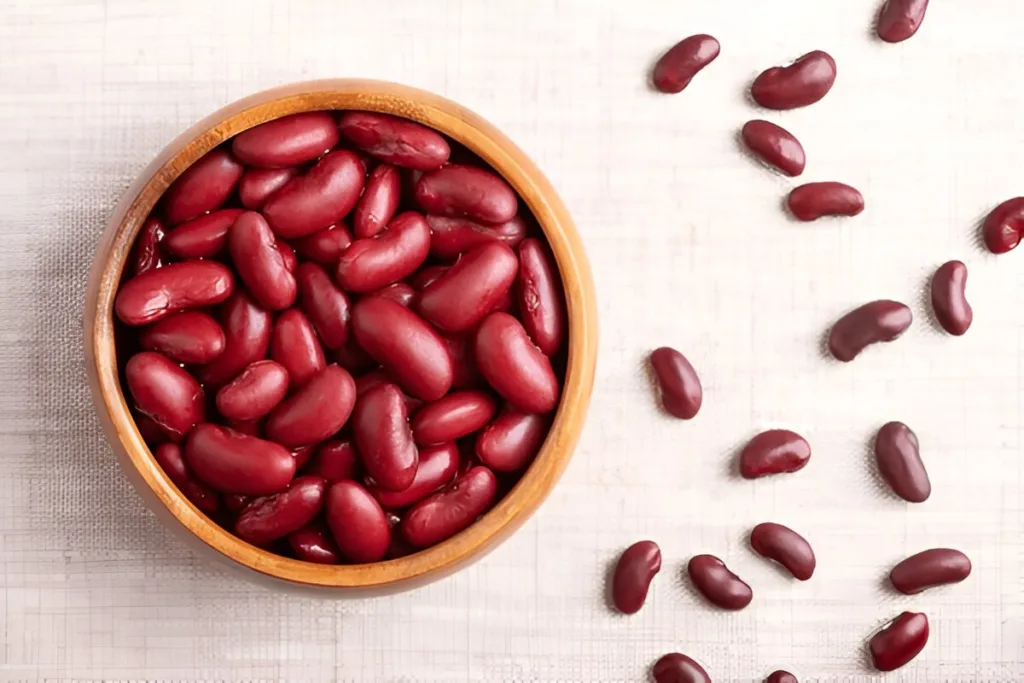
Kidney beans are a great source of fiber, providing up to 13 grams per cooked cup. The high fiber content in beans promotes healthy digestion, lowers cholesterol levels, and helps stabilise blood sugar levels.
Additionally, with fiber, kidney beans are enriched with plant-based protein, which keeps you satiated. The presence of essential nutrients like iron, potassium, and antioxidants makes it an excellent option for enhancing your overall health. Toss them into soups or stews, add them to your salad, and make your meal fiber-rich and more nutritious.
17. Navy Beans
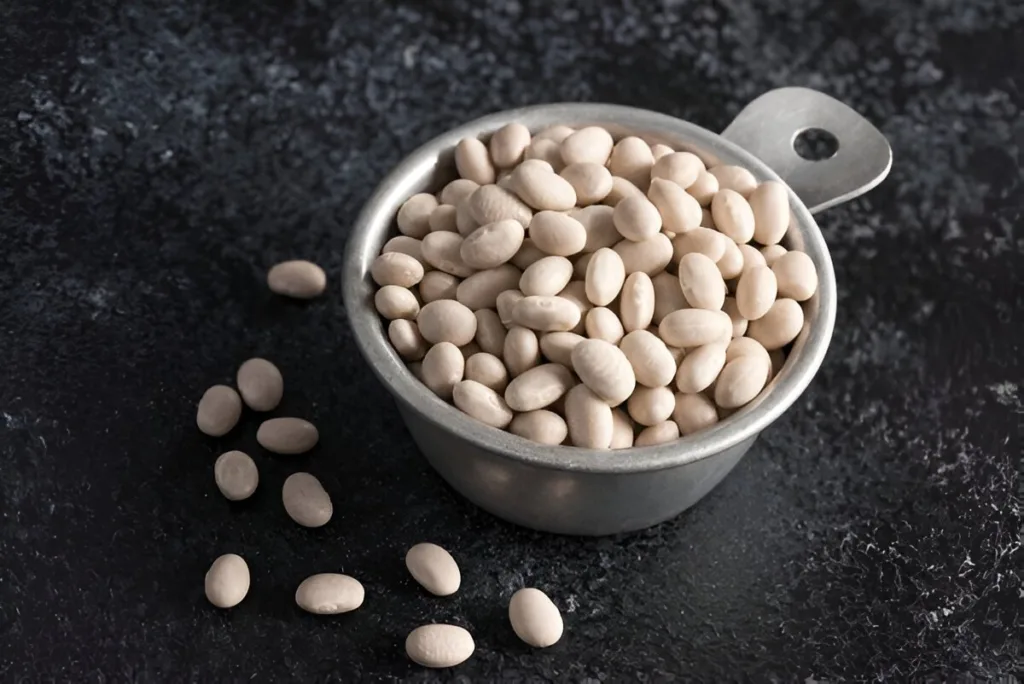
Navy beans are a fiber powerhouse, weighing around 19 grams per cup. The fiber is both soluble and insoluble. Soluble fiber absorbs water and forms a gel-like substance in the colon, helping with digestion, stabilising blood sugar levels, and promoting satiety, which helps in weight management.
Packed with plant-based proteins and vitamins, navy beans provide sustained energy and keep your heart healthy.
18. Edamame
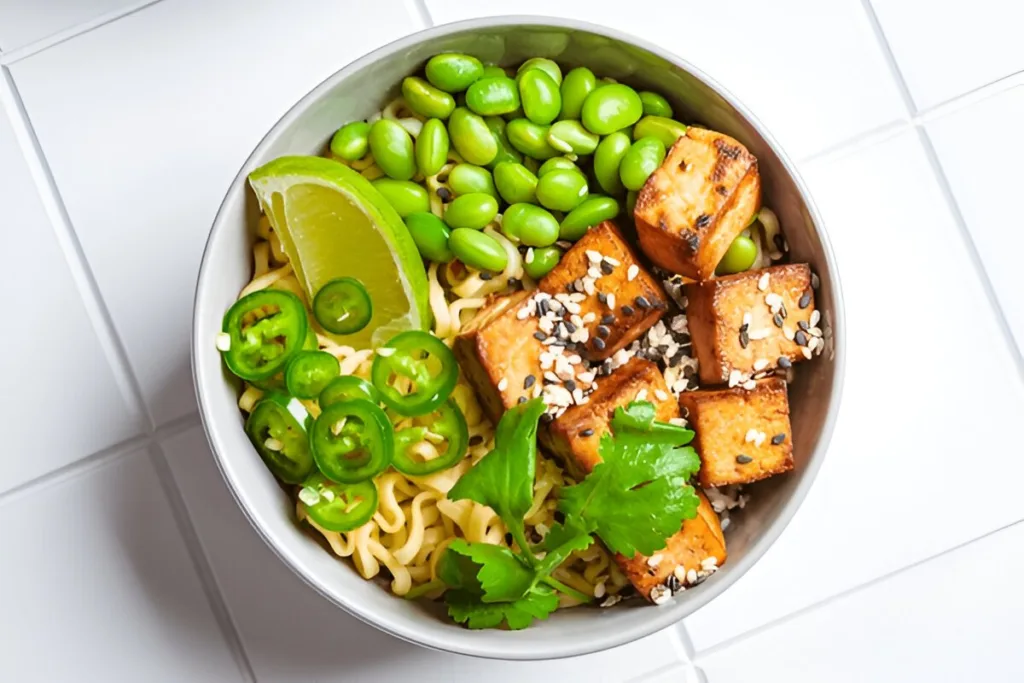
Edamame, commonly known as young soybeans, is an excellent source of dietary fiber that keeps you full for longer and improves your digestion. An edamame offers upto 8 grams of fiber per cooked cup, making it a nutrient-dense snack.
Enriched with soluble and insoluble fiber, it helps regulate blood sugar levels, lowers cholesterol levels, and improves your gut health. Adding edamame to your diet offers a natural boost to your fiber intake.
Vegetables High In fiber
19. Broccoli
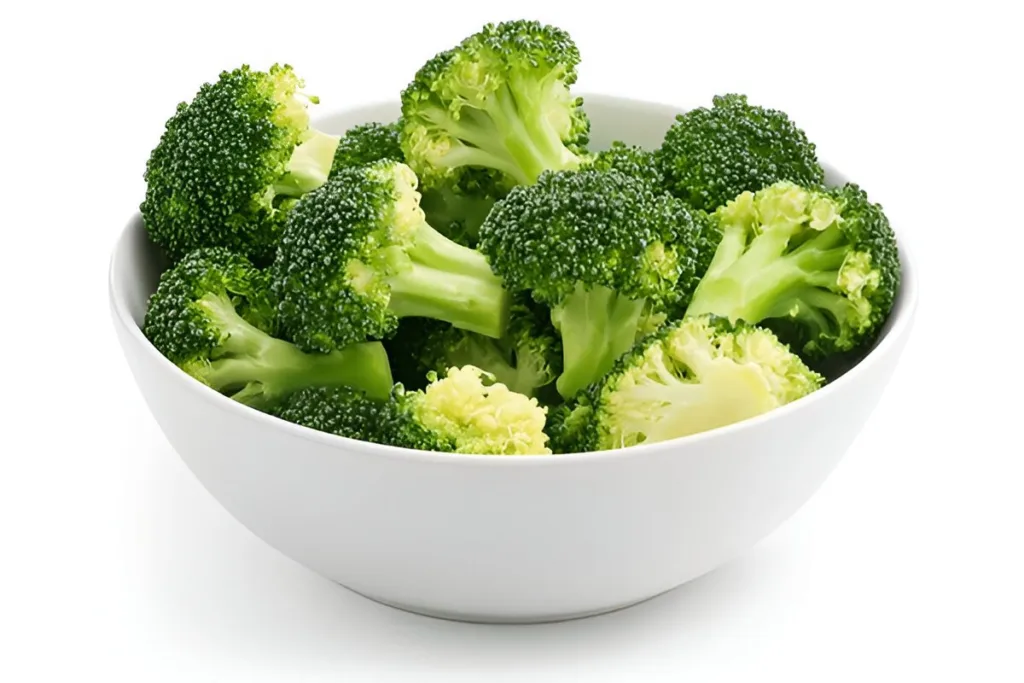
Broccoli is a fiber-rich vegetable that provides up to 5 grams per cup. Enriched with vitamin C and sulforaphane, it is a powerful compound that promotes fat loss and enhances overall health. The fiber-rich content in broccoli helps regulate bowel movements, prevents constipation, and elevates your gut health.
In addition to rich fiber content, broccoli nourishes beneficial gut bacteria, contributing to a balanced gut microbiome. It also helps enhance your metabolism, making it a great addition to your fiber-rich diet.
20. Brussels Sprouts
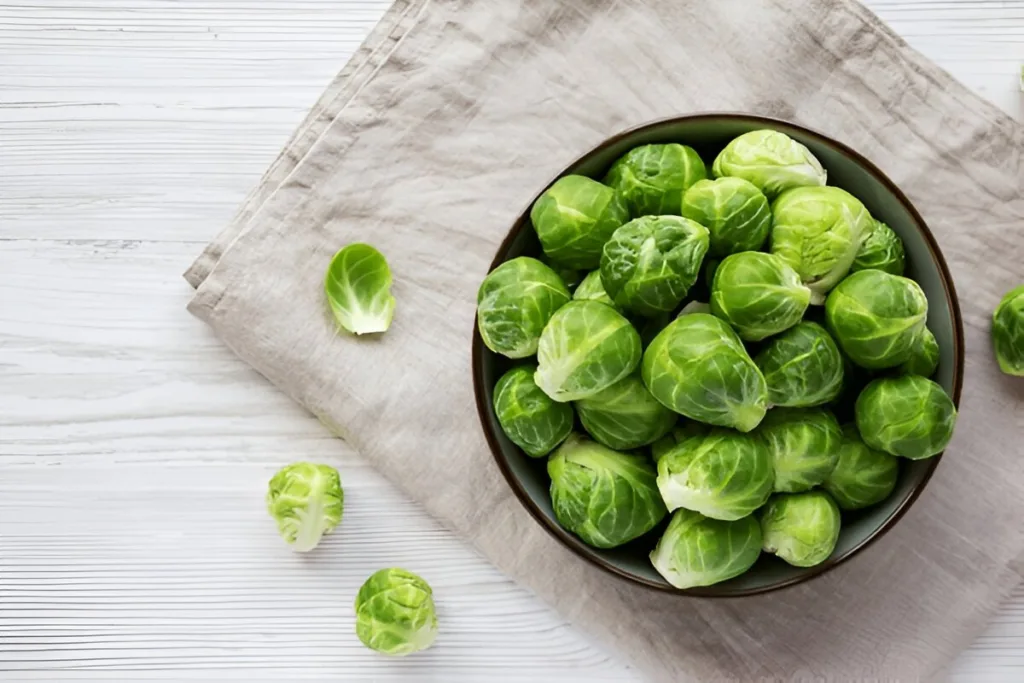
Brussels sprouts provide approximately 4 grams of fiber per cup, whether you love or hate them. This fiber is beneficial in enhancing your digestive health by improving your bowel movements, preventing constipation, and promoting a healthy gut.
Brussels sprouts are also enriched with anti-inflammatory properties, which reduce the risk of chronic diseases and prevent cell damage. Incorporating Brussels into your diet elevates your digestive health while offering a nutrient-packed, fiber-rich option.
21. Carrots
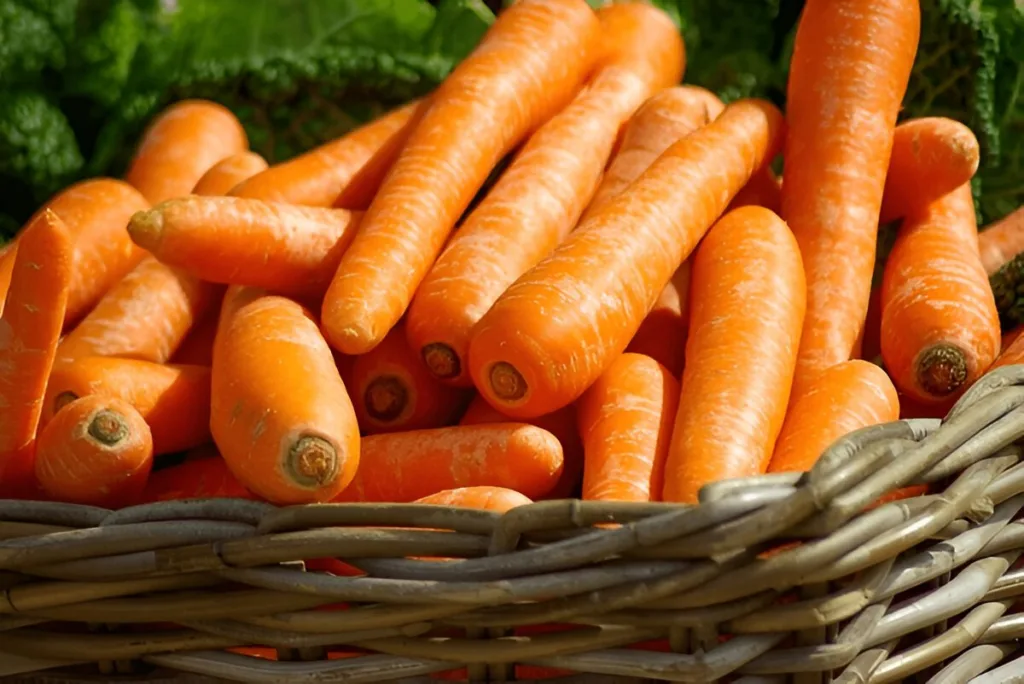
Carrots, crunchy and naturally sweet, offer about 3.5 grams of fiber per cup, which aids in your digestion, promotes healthy bowel movements, and enhances your gut health.
Enriched with antioxidants, espicially beta-carotene, carrots promote your eye health and immunity. This makes carrots a simple, nutrient-packed snack that boosts your fiber intake while satisfying your cravings.
22. Sweet Potatoes
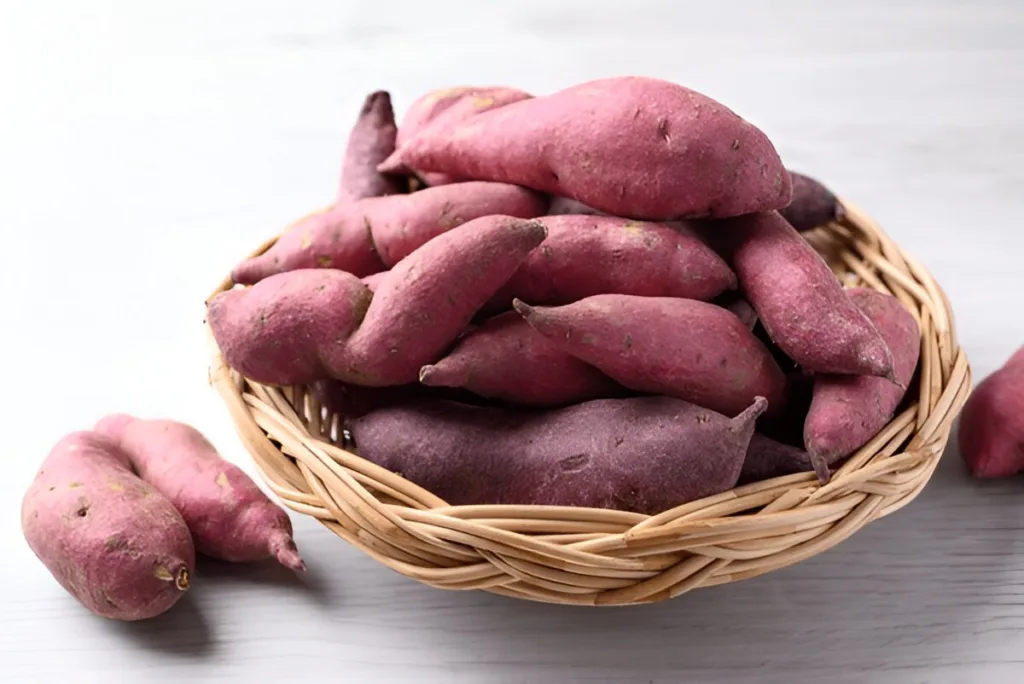
Sweet potatoes provide up to 4 grams of fiber per medium-sized potato, especially when eaten with the skin. This aids digestion, prevents constipation, and promotes a healthy gut environment.
Sweet potatoes are packed with beta-carotene, vitamins A and C, potassium, and antioxidants, which help enhance the immune system, protect eye health, regulate blood pressure, and fight inflammation. They are naturally sweet, which makes them a nourishing addition to your meal. Have them roasted, baked, or mashed.
23. Artichokes
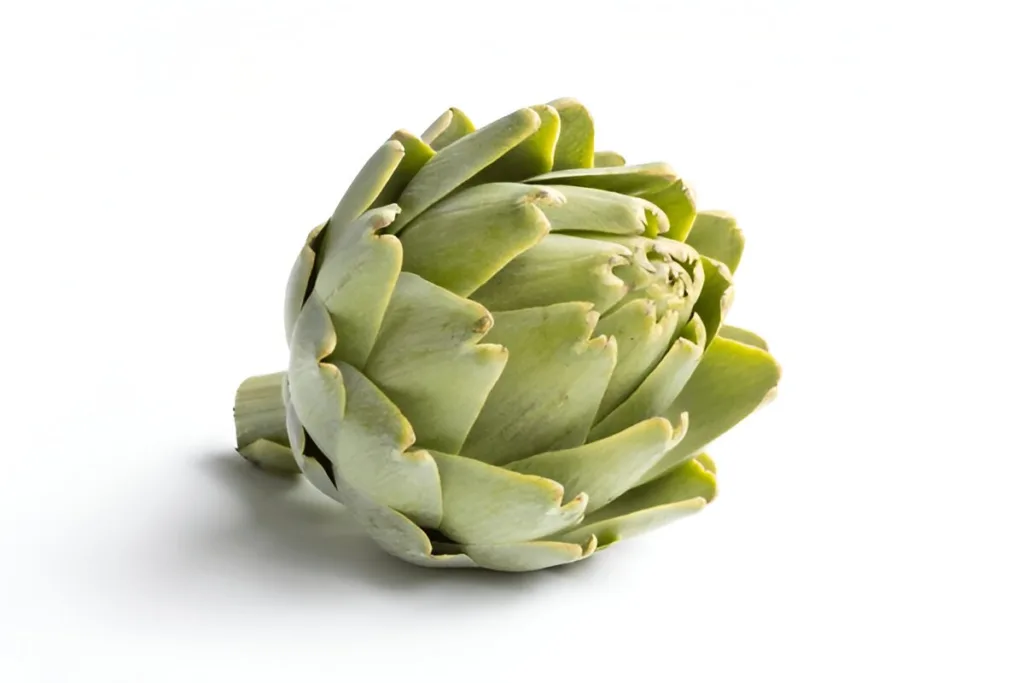
Artichokes are a great source of fiber that provides up to 7 grams per medium artichoke. It mainly consists of soluble fiber inulin that helps digestion by regulating bowel movements and promoting the growth of beneficial gut bacteria.
Apart from fiber, artichokes are enriched with antioxidants, vitamins C and K, and essential minerals like magnesium and potassium. It may also aid in liver detoxification, promote heart health, and help manage healthy blood sugar levels, making them nutritious and fiber-rich vegetables to include in your meal.
24. Green Peas
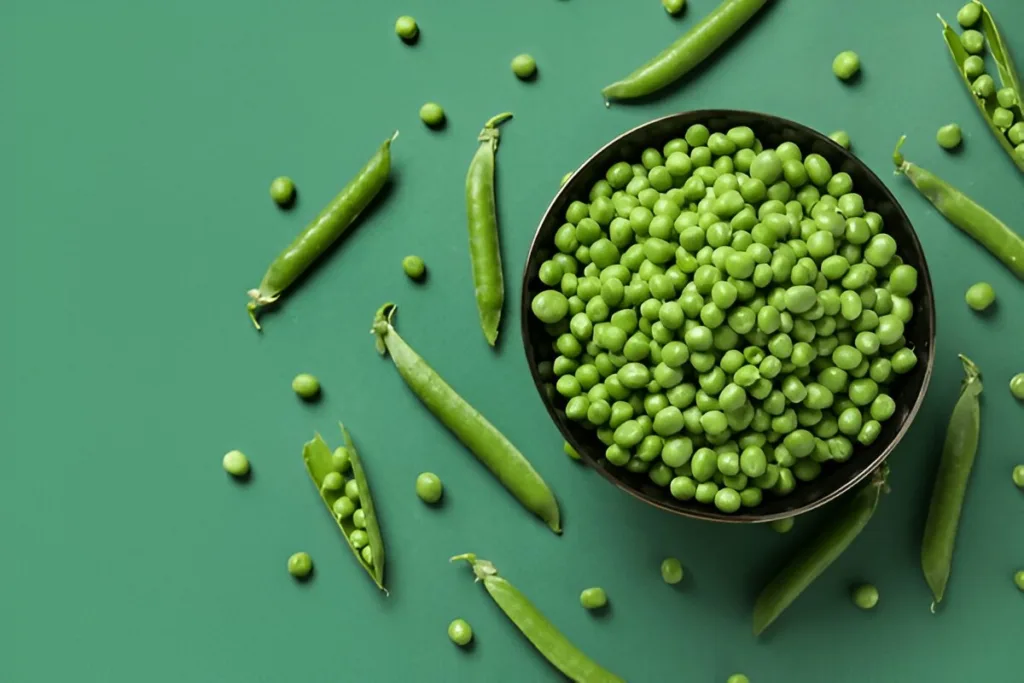
Green peas are also a great source of fiber, providing up to 7 grams of fiber per cooked cup. This fiber keeps you satiated long and enhances your digestion by supporting healthy gut health.
Green peas are also enriched with plant-based protein and contain essential vitamins and antioxidants. They contribute to stronger immunity and also enhance your heart health. They are easy to add to soups, stews, or as a vibrant side dish.
Grains High In fiber
25. Oats
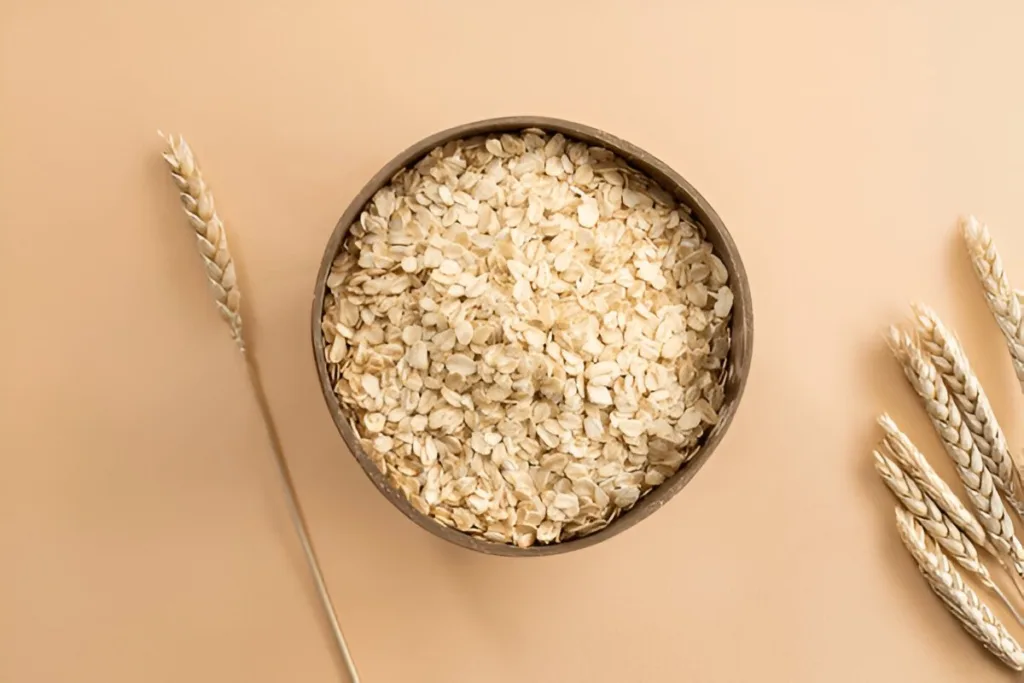
Oats are becoming more popular as a weight-loss breakfast, offering up to 4 grams of fiber in one cooked cup. It consists of beta-glucan, a type of soluble fiber that promotes heart health and elevates your digestive health by promoting regular bowel movements and a healthy gut.
It also consists of manganese, magnesium, phosphorous, and B vitamins, which help stabilise cholesterol, blood sugar, and energy levels, making them nutritious and a satisfying start to the day.
26. Quinoa
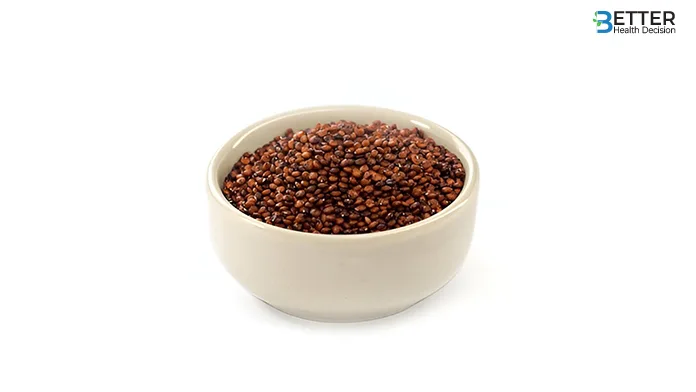
Quinoa is also a good source of fiber, containing about 5 grams of fiber per cooked cup, aiding digestion and weight management. It consists of soluble and insoluble fiber, with up to 75% being insoluble, which adds bulk to the stool, promotes regular bowel movements, and enhances satiety.
Besides fiber content, quinoa also aids in regulating blood sugar levels, which is very beneficial for heart health. High-fiber meals for weight loss, such as quinoa, can help support digestion and keep you feeling full longer. This versatile grain can be sprinkled on salads or served as a side dish.
27. Barley
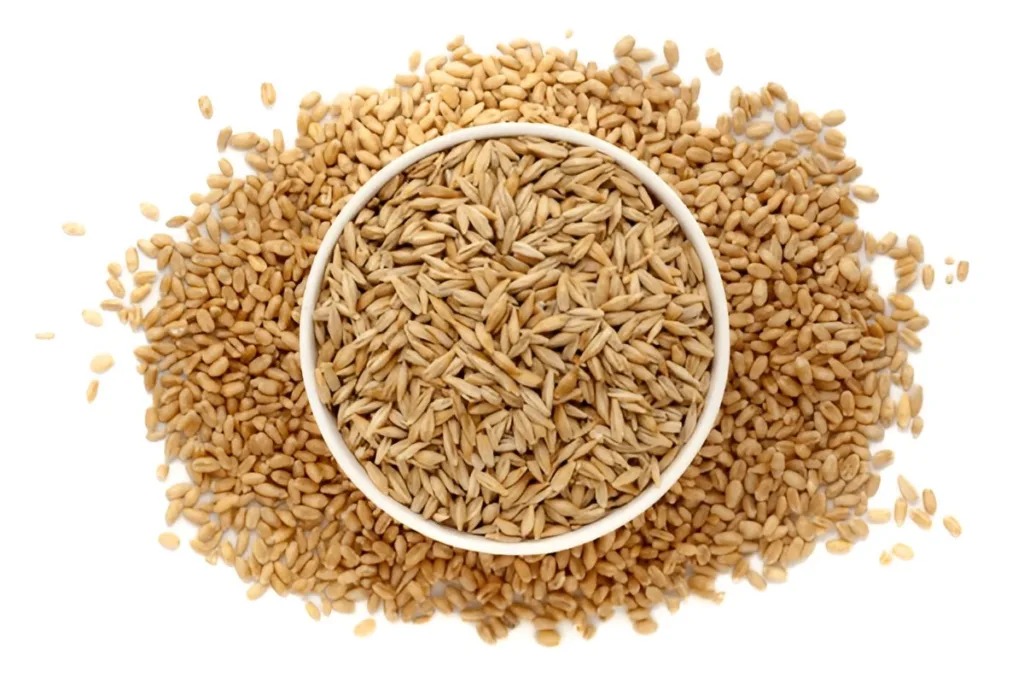
Barley is also a good source of fiber content that provides up to 6 grams of fiber with one cooked cup. It consists of soluble fiber, forming a gel-like substance in the digestive tract, slowing digestion, promoting better nutrient absorption, and supporting a healthy heart.
Because of its versatility, barley can be used in many ways, like in soups, as a nutritious side dish, salads, or a grain bowl base. Its mild flavour and chewy texture make it a great addition to various meals.
28. Brown Rice
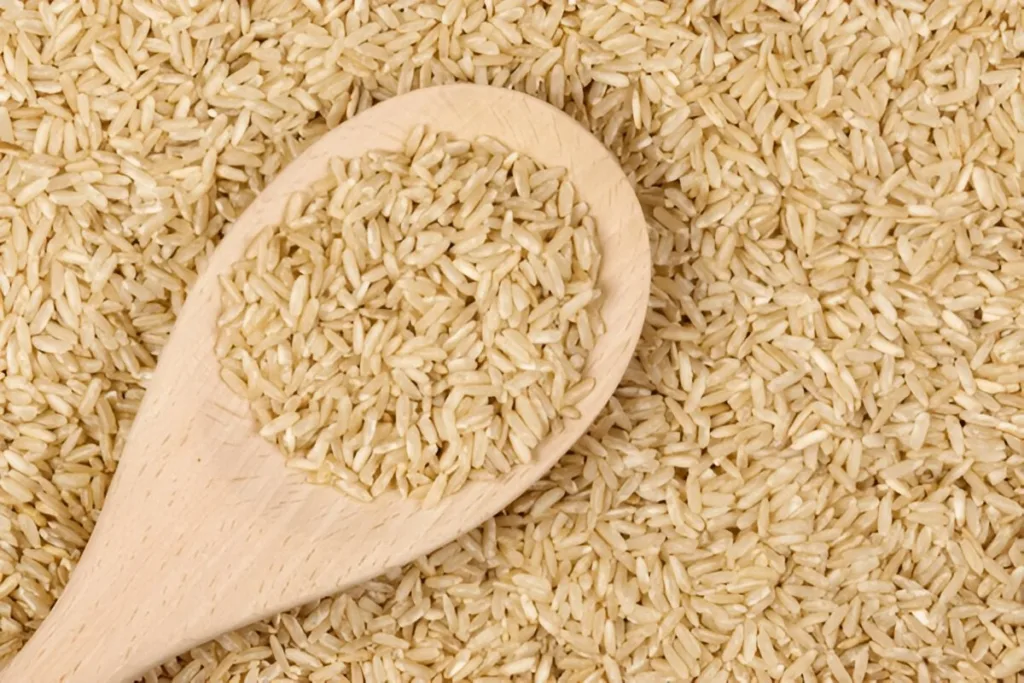
Brown rice is a whole grain that retains its bran and germ, making it fiber-rich. One cup of cooked brown rice provides up to 3.5 grams of fiber, which also aids in digestion and regulates healthy blood sugar levels.
The richness of high fiber content promotes a feeling of satiety, which also helps with weight management. It consists of essential nutrients like magnesium, which supports muscle function, bone health, and energy production. Additionally, brown rice is enriched with essential vitamins and minerals, such as B vitamins and iron, enhancing your metabolic process.
Nuts High In fiber
29. Almonds
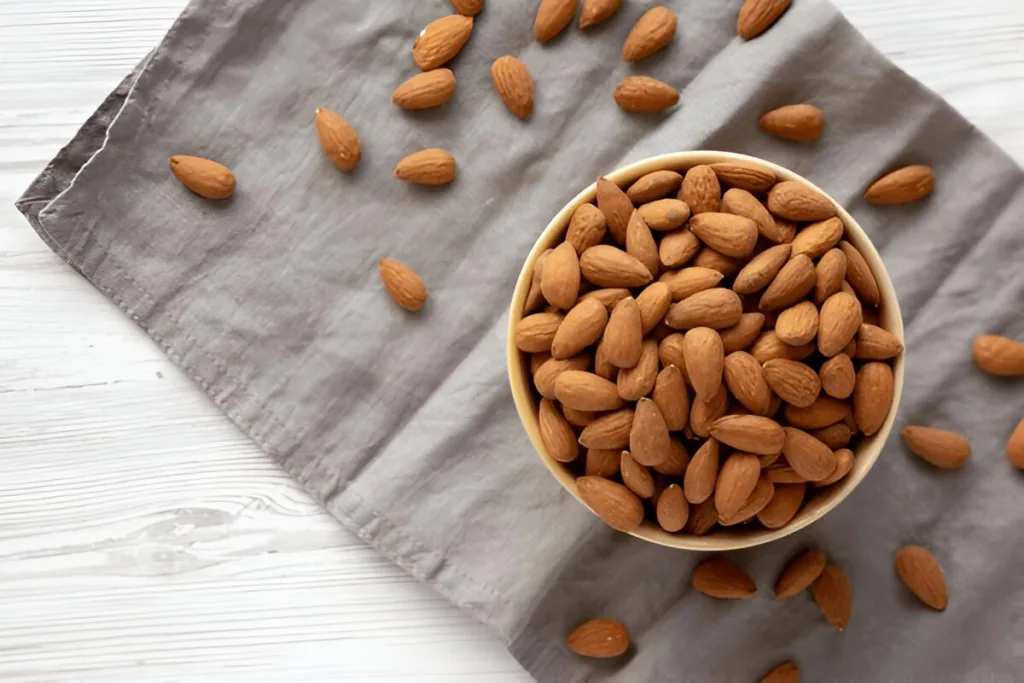
Almonds are a nutrient-dense nut packed with healthy fats, proteins, and fiber. A serving of almonds (around 20 almonds) provides up to 3.5 grams of fiber, keeping you full for a more extended period and improving your digestion. They are an excellent choice for healthy snacking and fit perfectly into a high-fiber diet for weight loss.
Rich in healthy monounsaturated fats, almonds are beneficial in maintaining heart health as they help lower cholesterol levels. Almonds are versatile, making them a great addition to your savoury and sweet dishes.
30. Pistachio
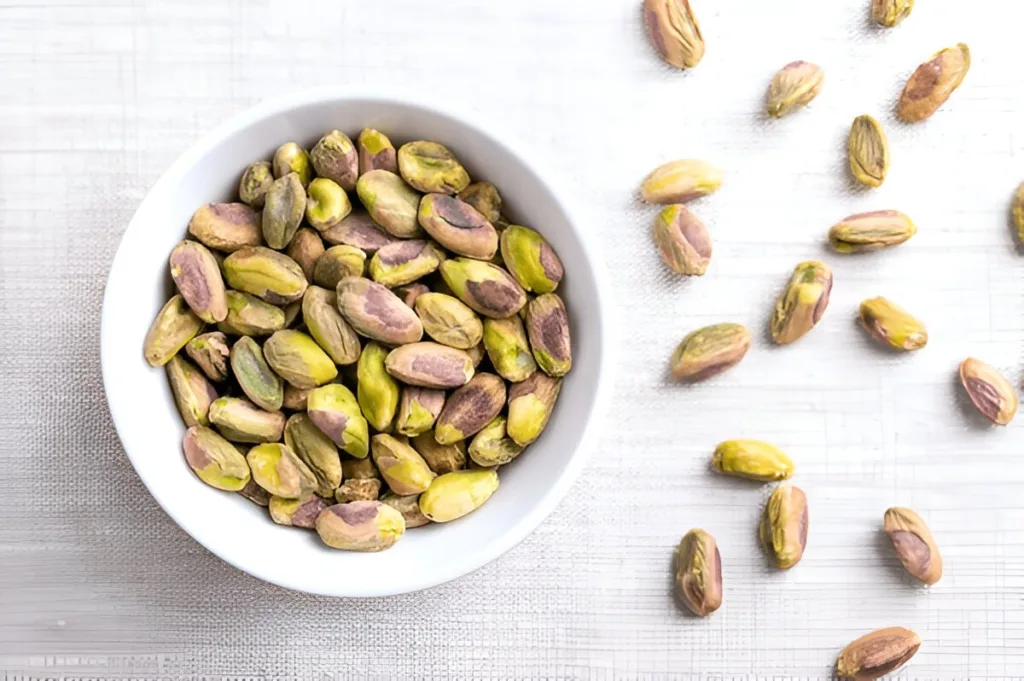
Pistachios are also enriched with fiber, which offers up to 3 grams per serving. It also acts as a prebiotic, digested by good gut bacteria, elevating their growth. Pistachios contain insoluble fibers that help control appetite and make them a great snack.
The fiber in pistachios helps regulate blood sugar levels, reducing the risk of blood sugar spikes and supporting overall metabolic health.
High fiber Food Chart
| Food | Fiber(per 100 g) |
| Chia Seeds | 34.4g |
| Lentils | 7.9g |
| Black Beans | 8.7g |
| Oats | 10.6g |
| Avocado | 6.7g |
| Sweet Potatoes | 3.0g |
| Raspberries | 6.5g |
| Almonds | 12.5g |
Frequently Asked Questions
1- What are natural fibers?
Natural fibers are plant-based substances in foods like fruits, vegetables, whole grains, and legumes. These foods with lots of fiber support healthy digestion and promote fullness, making them essential for a balanced and nutritious diet.
2- How many types of fibers are there?
There are two main types of fiber: soluble and insoluble. Soluble fibers are found in oats, beans, and fruits and readily dissolve in water, helping to lower cholesterol levels. Insoluble fiber from fiber sources such as whole grains, vegetables, and nuts adds bulk to stool and aids digestion.
3- What is the rule of fiber in the diet?
Experts recommend a daily fiber intake of about 25-30 grams, with 6-8 grams from soluble fiber, as it aids digestion. A high-fiber diet, rich in whole grains, fruits, vegetables, and legumes, helps improve digestive health and maintain regular bowel movements.
4- How is fiber digested?
fiber is not fully digested by the body but passes through the digestive system mostly intact.
Soluble fiber absorbs water, while insoluble fiber adds bulk, aiding digestion and bowel regularity.
5- How can I increase my fiber intake?
You can increase your fiber intake by adding foods with lots of fiber, such as whole grains, fruits, vegetables, and legumes, to your diet. High fiber foods for constipation, like oats, chia seeds, and leafy greens, can help improve digestion and promote regularity.

